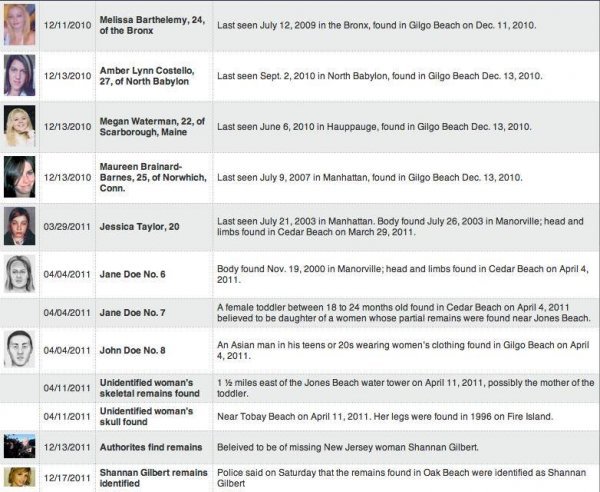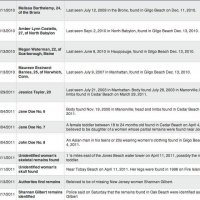I think it might be a good idea to post this article. It has probably been posted before but is good to recap.
Thomas Spota and Christopher McPartland were convicted of obstruction of justice and other crimes for their role in a scheme to protect James Burke.

www.nytimes.com
"Loyalty was currency, and at one 2015 meeting Mr. Spota said that any police officers who flipped were “dead,” and “would never work in Suffolk County again,” according to court records. The “men in charge” — Mr. Burke, Mr. Spota and Mr. McPartland — called themselves “the administration,” Mr. Hickey testified.
Detectives who knew of the 2012 assault of the man, Christopher Loeb, who had stolen Mr. Burke’s duffel bag, testified that they were afraid to come forward in part because Mr. Spota, Mr. McPartland and Mr. Burke were powerful and could retaliate against them and their families.
“If you crossed Tom Spota, Chris McPartland, Jimmy Burke, you crossed all,” Mr. Hickey, who pleaded guilty to conspiracy to obstruct justice for his role in the scheme, testified at trial. “They will destroy you. Personally, financially, criminally. They will go after your family.”
He added, “They know no bounds.”
Mr. Loeb had been burglarizing cars when he took the bag from Mr. Burke’s vehicle. Among the bag’s contents were sex toys, cigars, and pornography on DVD — items the chief of one of the largest police departments in the United States did not want anyone to know he had.
When Mr. Burke found out that Mr. Loeb had been apprehended and his items had been recovered, he drove to Mr. Loeb’s home. He retrieved some of his property, which according to protocol should have been cataloged as evidence, and then drove to the police station where detectives he had handpicked were interrogating Mr. Loeb. Mr. Burke then physically assaulted Mr. Loeb, who had already been slapped by the detectives.
In court on Tuesday, Mr. Loeb, 34, stood before the judge “as a man with purpose,” he said. “Nobody should have this much power,” he read from a prepared statement. “Thomas Spota should spend the rest of his life behind bars.”
Mr. Loeb suggested every case Mr. Spota tried be re-evaluated, and said the former district attorney had “infested Suffolk County with corruption.”
Witnesses described Mr. Spota’s relationship with Mr. Burke as akin to a father and son, or a mentor and protégé. Mr. Hickey called Mr. Spota “Burke’s fiercest defender and protector.” During closing arguments, Mr. Spota’s lawyer, Alan Vinegrad, referred to the former police chief as, “Tom Spota’s professional child, of sorts.”
“Wanting to help Jimmy Burke is not a crime,” Mr. Vinegrad said. “Being a concerned professional parent of sorts, believing your professional child would never have done such a crazy and stupid thing as walking into a police station house in broad daylight and assaulting a prisoner, being concerned is not a crime.”
Per Mr. Hickey’s description, Mr. McPartland and Mr. Burke were best friends. It was a different dynamic, but a significant one.
“Chris would be the first person that Burke would turn to when he was in trouble,” Mr. Hickey said.
The convictions of Mr. Spota and Mr. McPartland followed a series of high-profile corruption cases on Long Island.
In 2017, former Suffolk County Conservative Party head
Edward Walsh was convicted of wire fraud and theft of government services — crimes committed while serving as a lieutenant for the Suffolk County Sheriff’s Department. Two years later, across county lines, former Nassau County Executive Edward P. Mangano and his wife, Linda, were
convicted of federal corruption charges that included bribery and wire fraud. Mr. Spota and Mr. McPartland were convicted months later.
The prosecution’s case against Mr. Spota and Mr. McPartland involved a web of phone records, which prosecutor Lara Treinis Gatz said showed Mr. Burke making calls from cellphones that were not his, while Mr. Spota was concerned that his communications were being bugged.
“These people are prosecutors,” Ms. Gatz said during the trial. “They are acutely aware of investigative techniques and how to thwart them.”
Mr. Hickey was the detectives’ direct supervisor and as such could communicate with them without raising suspicion. He was a strategic choice, prosecutors said, because he had a history of alcoholism and lying that would make it easy for defense attorneys to discredit his testimony in the courtroom.
But that plan also backfired. The jury believed Mr. Hickey’s account.
Speaking outside the courthouse after the sentencing on Tuesday, Nicole Boeckmann, an assistant U.S. attorney who prosecuted the case, said Mr. Spota and Mr. McPartland had corrupted the institution they led.
“Their insidious alliance with James Burke, and their willingness to protect him at all cost, perpetuated the notion that prominent public officials, no matter how corrupt, are untouchable — that they are above the law,” Ms. Boeckmann said. “Today, we know that not to be true.” "


 www.crimewatchers.net
www.crimewatchers.net













